
Clarity - INT9 A/D converter | Brief Description |
A/D Converter types in general
Prior to collecting and processing the chroma- tographic signal by a computer, the analog signal of the detector must first be converted to digital form using an analog/digital (A/D) converter.
In principle, there are three types of A/D converters – sampling, integrating and ΔΣ
The INT9 card uses
Advantages of the INT9 A/D converter
•No loss of input signal during integration. There are no time delays during which the converter fails to integrate the input signal.
•No continuous servicing of the input analog switches, which would otherwise cause errors (offset, noise).
•Substantially smaller amounts of data entering the computer due to individual data items already representing partial integrals.
1.2Hardware and software requirements
The INT9 A/D Converter for PCI slot can be used with Clarity software on PC’s using the following operating systems: MS Windows 2000/XP/Vista.
The PC must have one free PCI slot for your INT9 card.
Caution! |
| Full size PCI 2.0, 32 bit PCI slot is required. Low |
| ||||
|
| profile or PCI Express slots cannot be used. |
|
| |||
Hardware and Software Compatibility: |
|
|
|
| |||
|
|
|
|
|
| ||
Software \ Windows | Vista | XP | 2000 | NT | 98/Me | ||
|
|
|
|
|
| ||
Clarity * | Yes | Yes | Yes | No | No | ||
Clarity Lite * | Yes | Yes | Yes | No | No | ||
CSW32 | No | No | No | No | No | ||
* From Clarity version 2.4.4.122
5
